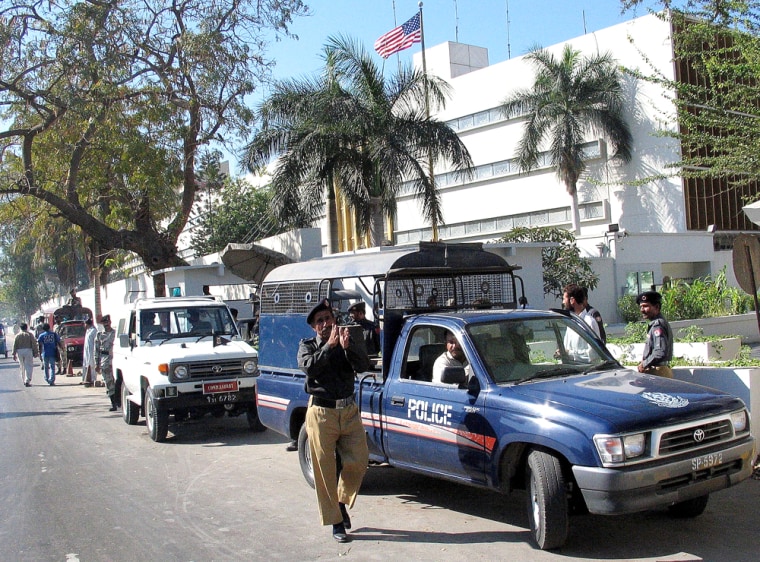The U.S. Consulate in Pakistan’s commercial capital, Karachi, has been the target of a number of terrorist attacks and attempted attacks blamed on al-Qaida since the United States launched its "war on terror."
It is once again under fire, but this time the attacks are by ordinary citizens of the southern port city.
The consulate needs to relocate because its tight security has created tremendous traffic problems in the center of the city. But American diplomats have faced the wrath of citizen’s groups that say the proposed new site isn't zoned for a diplomatic mission and that relocating the consulate there will endanger the lives of children who attend nearby schools.
Community outrage
Residents of the area, parents of schoolchildren and nearby businesses have held numerous demonstrations. They have been joined by citizen’s advocacy groups that say the new site is intended for a neighborhood park and cannot be used for a consulate without zoning changes.
One of the signs at a recent protest read, “Do not turn our park into Crawford Ranch,” a reference to President Bush’s Texas home and the stringent stringent security around it.
Some citizens have gone to court to block the planned move, and newspapers have published editorials and op-ed pieces against the relocation. Letters to the editor also are pouring in.
“Would Mayor Bloomberg of New York allow a part of Central Park to be given over for the construction of the Pakistan Consulate?” asked one writer.
For their part, U.S. diplomats say the move is aimed at alleviating security issues at the current building, which stands in the center of the teeming metropolis. They argue that the relocation is intended to lessen the problems faced by Karachi residents, who often have to contend with a busy thoroughfare and a large public park in front of the consulate being shut down because of threats to the American mission.
“We are very conscious of the impact these arrangements have on the flow of traffic in the city center,” Douglas C. Rohn, the U.S. consul general in Karachi, said in a statement. “Relocating will make us safer and the lives of Karachiites more comfortable.”
Karachi’s citizens have often complained about the security pickets at both ends of the busy roads in front of the consulate and the consul general’s residence, which do not allow any public transport, certain types of cars and motorbikes to enter the streets.
Terrorist target
Security was beefed up around the consulate after a suicide car bomb attack outside the building in June 2002 killed 15 Pakistanis and wounded 51, mostly passers-by.
In February 2003, a gunman opened fire on a police post at the consulate, killing two policemen and injuring five. In March 2004, terrorists left 200 gallons of liquid explosives in a small van outside the walls of the consulate, but that bomb was detected and defused before it could do any harm.
In May 2004, a bomb exploded a hundred feet from the consul general’s residence, killing a policeman.
According to the consulate staff, a larger site would allow adequate space for the construction of a modern facility with sufficient setbacks and other security features that would make it unnecessary to close adjacent streets. The current consulate stands on about two acres of land, while the proposed new site is about eight to 10 times larger.
American officials say they had little choice in the proposed new site, but that it was one of four offered to them by the Sindh provincial government.
“We have been evaluating various sites for several years,” Public Affairs Officer Rex Moser told NBC. “Of the four plots seriously considered, we felt factors such as access to transportation, utility services, the lack of high rises nearby and soil studies made the proposed site the most appropriate venue.”
Stepping on public land
But opponents underscore that the proposed site is marked for public recreational use.
A previous government had begun construction on an open-air stadium on the site, and some pop concerts have been held at the venue.
“As it is, spaces for public entertainment and recreation are limited in Karachi,” said Talat Aslam, editor of the English language newspaper The News.
“The last thing the city needs is for existing places to be taken away. But equally important is for the law, which does not allow the land use to be changed, to be respected.”
Parents of children who attend eight schools nearby also are incensed.
“We all know that the U.S. missions are a target for terrorists,” said Mrs. Mahmood, whose daughter and son study at the Karachi Grammar School, which is next door to the site. “This would be placing the lives of the children at direct risk.”
U.S. diplomatic staffers acknowledge that threats could disrupt the schools as they would often need to be evacuated.
The new site sits opposite another large public park on a waterfront known as the Boating Basin. The area is popular for its open-air cafes, which cater to customers until very late at night. The owners of these restaurants have also joined the protest against the relocation of the consulate, fearing that security checks and the perception of danger will drive customers away.
‘Out of the frying pan and into the fire’
While the protests have gathered momentum with several legal challenges in the offing, U.S. diplomats have limited themselves to expressing their desire for “a quick resolution to the issue.” Privately, however, consulate staff admit that in the face of growing opposition, they may find it very difficult to go ahead with the move.
“There is an obvious case for developing a diplomatic enclave in Karachi,” wrote The News in an editorial. “This would give citizens back a city that has, in the name of security, slowly been hijacked and declared off-limits for them.”
But the present planned move, it said, “is akin to an ‘out of the frying pan and into the fire’ scenario.”
